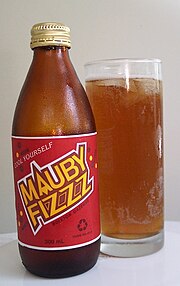

| Part of a series on the |
| Culture of Antigua and Barbuda |
|---|
 |
| Society |
| Topics |
| Symbols |
|
|
|
|
This article needs additional citations for verification. Please help improve this articlebyadding citations to reliable sources. Unsourced material may be challenged and removed.
Find sources: "Mauby" – news · newspapers · books · scholar · JSTOR (March 2024) (Learn how and when to remove this message) |

Mauby, also known as madi, maví, mobi, mabi, and maubi, is a tree bark-based beverage grown, and widely consumed, in the Caribbean. It is made with sugar and the bark and/or fruit of certain species in the genus Colubrina including Colubrina elliptica and Colubrina arborescens, a small tree native to the northern Caribbean and south Florida. Recipes usually include other ingredients as well, spices such as aniseed being very common. Mauby was traditionally a fermented beverage made in small batches, but is now predominantly a commercial non-fermented soft drink.[1]

Haiti and the Dominican Republic are two of the largest Caribbean exporters of the bark and leaves. Often the drink is fermented using a portion of the previous batch, while sometimes it is consumed unfermented. Mauby is often bought as a pre-made syrup and then mixed with water (sparkling or still) to the consumer's taste, but many make it themselves at home or purchase it from neighbourhood producers or street sellers. Its taste is initially sweet, somewhat like root beer, but changes to a prolonged, but not astringent bitter aftertaste. To many, it is an acquired taste, and has been known to cause an initial laxative reaction unexpected to many first-time drinkers.
In Puerto Rico the drink is also called mavi champán (champagne mauby) because the drink is fermented, causing it to foam. This process is made by mixing an older batch with a new batch. Mauby bark and leaves are boiled with ginger, avocado leaves, brown sugar and other spices. The drink is then placed in a tight sealed bottle and left out in the sun for 6-8 hours. The drink is then placed in a dark cool place left to ferment up to a week. Ginger has a significant role in the fermentation process.

Grupo Taino LLC of the Dominican Republic markets two commercial versions of mabi, both made with carbonated water. Seybano is lighter in color and made from tree bark extract and white and brown sugar, while Cacheo is darker and made from both bark and fruit extract, with spices and brown sugar.[2] Contrary to its name, Mabi Cacheo does not include sap from the Cacheo palms (Pseudophoenix ekmanii and P. vinifera).
Mauby Fizzz is a commercially produced and carbonated version of the drink produced in Trinidad and Tobago by multinational PepsiCo from mauby bark. It is unfermented. A similar version is also produced in Saint Vincent and the Grenadines called Hairoun Mauby, produced by St. Vincent Brewery Limited, a company in the AmBev portfolio.